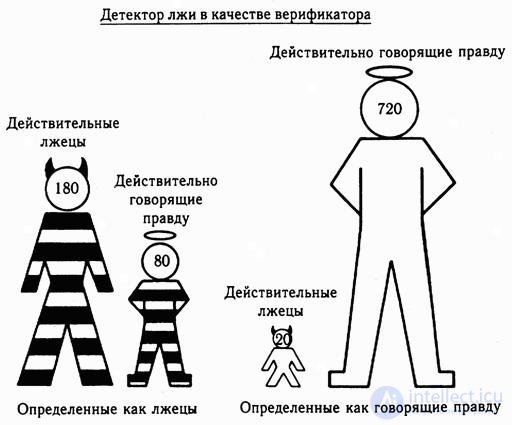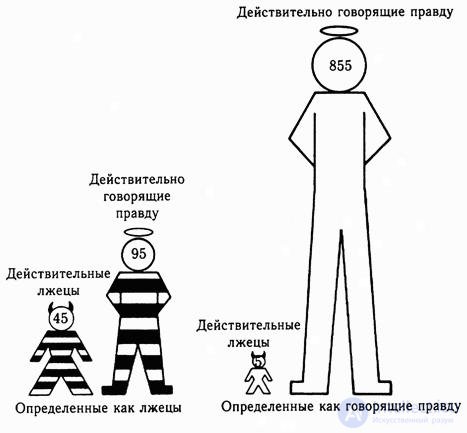If the desire to avoid hiring unwanted people is quite understandable, especially in such areas as intelligence agencies, jewelry trading, supermarkets, and so on, then it would seem no less understandable to be the need to conduct tests of already hired employees to make sure that no unwanted faces got there. And this is indeed being done in many areas of work. But, unfortunately, there are no data here either, how accurate the results of such tests are. Perhaps the basic lie rate is lower here, since many unworthy people are already rejected by preliminary testing, and undesirable people have much less opportunity to hide among other workers. But the lower the base lie rate, the more mistakes you can make. If we again turn to the previous example, which dealt with a thousand verifiable and 90% accuracy of the detector, and agree that the base lie rate will not be 20%, but only 5%, it will turn out that: 45 liars will be determined quite right, but 95 people who speak the truth will also be recognized as liars; Of course, 855 truthful will be recognized as truthful, but 5 liars will still slip through, will still be mistakenly identified as telling the truth.

Lie Detector Test Results
Of the 1000 subjects, 20% (200) were liars Figures 16 and 17 clearly illustrate the results of such a low base lie rate. In order to sharpen the reader’s attention on how low the base lie rate affects the number of people mistakenly recognized as liars, I accepted a statement about the 90% accuracy of the detector results
[168] .
If the base lie rate is 20%, then every honest person will have two deceivers. If the rate is 5%, then, on the contrary, for every caught cheater, two people will be incorrectly identified as telling the truth.

Lie Detector Test Results
Of the 1000 subjects, 5% (50) were liars The argument against the use of the detector, based on the fact that the very need to pass the test and indignation about this is already making it difficult to obtain accurate results, and we can easily apply this situation. Receiving an invitation to undergo a detector test, already working people may experience outrage even much stronger than candidates.
All this fully applies to the police, and to employees of organizations such as the NSA. In the police, the detector is used extremely rarely to test employees, although it is sometimes resorted to, recalling the multitude of all sorts of temptations, rooted in the very nature of the work, or running into corruption cases. The NSA also sometimes uses a detector; if the worker fails the test and cannot explain his failure further, an investigation is initiated against him. When I asked what happens when a question is not resolved (that is, when a person does not stand the test all the time, but they can’t find anything illegal), in response I heard the following: this never happens. The police are the police in order to get to the bottom of the truth, and the decision is never taken formally. True, it is very difficult to catch a person who has been working for many years, based not on real wrongdoing, but only on his failures in passing tests on the detector. If an employee is innocent, then anger caused by his being suspected of lying could lead him to divulge secret information that he owns. But if every time the question: “Did you disclose any secret information to agents of any foreign intelligence last year?” The detector will definitely record emotional excitement with a negative answer, it is very difficult not to initiate an investigation.


Comments
To leave a comment
Psychology of lies
Terms: Psychology of lies